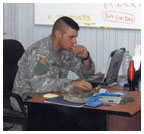
|
December 13, 2006: From the Editor
1st Lt. Nate Rawlings ’04 at work at Camp Liberty in Iraq. (Photo by Whitney Terrell ’91) |
As a Princeton student, Nate Rawlings ’04 may have been best known for his relentless performance on the wrestling mat and on the rugby field. This fall, he achieved a degree of national recognition for his contributions in a more dangerous arena, as an officer in an Army company that searched for hidden bombs in Iraq.
Rawlings is a central figure in an article by Whitney Terrell ’91 that ran in The Washington Post Magazine Oct. 29, and which is excerpted in this issue beginning on page 18. Last summer Terrell, a novelist and teacher, was embedded with Rawlings’ company of combat engineers near Baghdad, conducting research for a new work of fiction as well as for this article, “The Bomb Squad.”
Like Terrell, Rawlings is a writer and former student of John McPhee ’53; after his service ends, he plans to continue serving in the National Guard while beginning a career as a journalist. “Perhaps one day,” he told PAW, “I will write about the life-altering experience of the past year.” He has already begun that process by writing a short essay for PAW, available at www.princeton.edu/paw.
“In addition to the section of Highway 1, my platoon was also responsible for the security of the villages, homes, and markets that flanked the road,” Rawlings recounts in his essay. “[O]ne by one the scenarios on which we trained so diligently metastasized into realities: small-arms fire attacks, rocket-propelled grenade attacks, roadside bomb strikes against us and against civilians.
“I drank Chai tea and sucked down cigarettes with Iraqi soldiers and families, adhering to the rule that it was disrespectful to refuse anything a host offered in an Arab country. I held hands with farmers and promised that I would look after their children — that I would spare them from the bad people who always seemed to come from somewhere else, commit heinous acts, then disappear like phantoms into the night. I questioned my own humanity after yelling at a woman for allowing insurgents to attack us from her room; the outburst occurred the morning after we had been caught in a fierce ambush and we had subsequently destroyed part of her house with artillery fire in the ensuing firefight.”
For Rawlings, who expected to return to the United States in early December but was prepared to return to Iraq next year, Princeton was a bridge that connected his old life to his new one. Professor Miguel Centeno sent care packages that Rawlings shared with his platoon; friends, coaches, and professors offered continuing support. Terrell became a friend to the soldiers, intent on telling their story through their eyes.
After the story first appeared, Rawlings’ soldiers continued conducting
daily patrols and began to prepare to return home. September and October
were difficult months, he said: “We all lost friends and close colleagues
during that time, and seeing Whitney’s story served as a much-needed
pick-me-up for many of my men.”
![]()
![]()
Marilyn H. Marks *86
mmarks@princeton.edu

